In so doing he becomes the first former US president to be convicted of a crime in the history of the United States.
Whatever happens next, that fact will stand.
It will sit in the historic record, ahead of the entry that notes he was the first president to be impeached twice by the house of Representatives.
Once for the 6 January attack on the Capitol in 2021, and once in 2019 for threatening to withhold US weapons from new Ukrainian President Volodymyr Zelensky unless he investigated Hunter and Joe Biden (his election opponent), though on both occasions he was acquitted after a trial in the Senate.
His own name now appears on the same list of former Trump aides and employees who have subsequently been convicted by the courts, including former national security advisor general Michael Flynn, former campaign manager and White House communications chief Steve Bannon, chair of his 2016 campaign Paul Manafort, deputy chair of the 2016 campaign Rick Gates, campaign advisor George Papadopoulos, trade advisor Peter Navarro, political associate Roger Stone, fundraiser and RNC official Elliot Broidy, Trump Organization chief financial officer Allen Weisselberg, and former fixer and personal lawyer Michael Cohen.
Some were pardoned by Trump (Stone, Manafort, Briody and Flynn), others - notably Cohen - were not.
And it was Cohen who probably did for Trump in the end. He was, to cite the name of his first book, 'Disloyal', because he dished the dirt on Trump, his property empire and the 'catch and kill' scheme with the National Enquirer at a congressional hearing before going to jail for paying the hush money to Stormy Daniels.
That is what set off two investigations - one that led to Trump's $400 million (€370m) fine in a civil fraud case in March. The second that led to the unprecedented conviction in a criminal case last night.
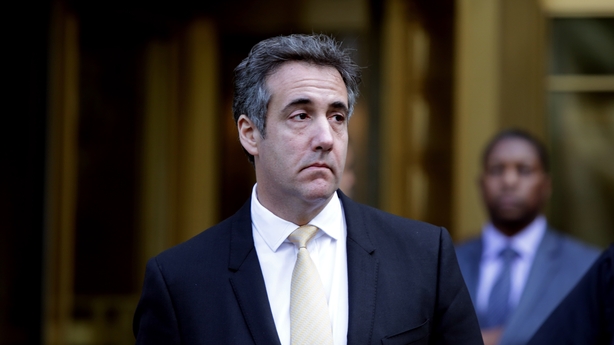
In so doing, Cohen has achieved the title of his second book - 'Revenge'.
Yes, he has a lengthy track record of being an unreliable witness. OK, it's a lengthy record of lying - often under oath - and being exposed for it.
But the jury were undeterred by this, despite the strenuous efforts of Trump's defence lawyers to undermine his credibility - even claiming he had lied under oath to the judge and jury in this trial.
But Cohen has been saying for the past year in his twice weekly "Mea Culpa" podcasts that his word was not going to convict Trump, for he had passed on to prosecutors a haul of documents and recordings that corroborated what he had said. And the prosecutors were able to call 19 other witnesses who could corroborate parts of the tale.
Read More:
What charges did Donald Trump face in hush money trial?
As it happened: Trump says 'real verdict' on 5 Nov after guilty verdict
The one who added the least to the case against Trump was the one who attracted the most attention - Stormy Daniels.
She was part of the "why" of the conspiracy: in the wake of the Access Hollywood tape recording of Trump making lewd and boorish comments about women, the emergence of Stormy's story (and that of former Playboy model Karen McDougal) had to be stopped in the panicky final weeks of the 2016 campaign.
But that was all, just one point of information among many.
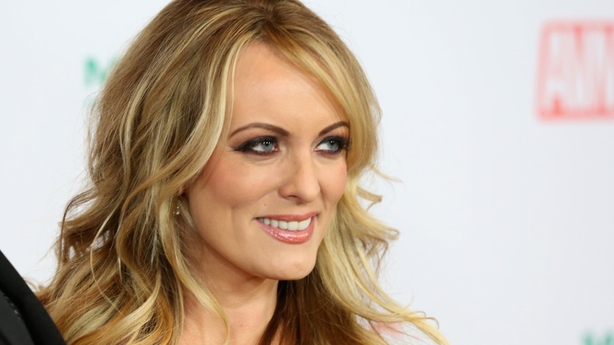
All of it was skillfully woven together in a five-hour closing statement by prosecution lawyer Joshua Steinglass.
Many observers thought he had droned on too long, convinced he had lost the jury.
But it seems more likely that he had done a good job of joining the dots to connect up all the bits of physical evidence, the witness statements in court, and the prosecutors theory of the crime - that Donald John Trump had falsified or caused to be falsified the records of the Trump Organization in order to conceal an attempt to interfere with the result of the 2016 presidential election.
The crucial bit of evidence was a piece of paper with the money to be returned to Michael Cohen for the Stormy Daniels' payoff, plus additional payments to take care of income tax and make it look like a business expense - not an effort to bury bad news about the candidate on the eve of the election.
The handwriting of Allen Weisselberg, the Trump Organization's chief financial officer, and Jeff McConney, the firm's financial controller, were on this paper.
That and the in-court testimony from David Pecker, the tabloid king who published the National Enquirer, who told the jury he offered his services to track down and kill off stories that could damage Trump in the election and publish hit job stories on his Republican opponents, notably Senator Ted Cruz at a meeting in the Trump tower with the candidate himself and his fixer, Michael Cohen.
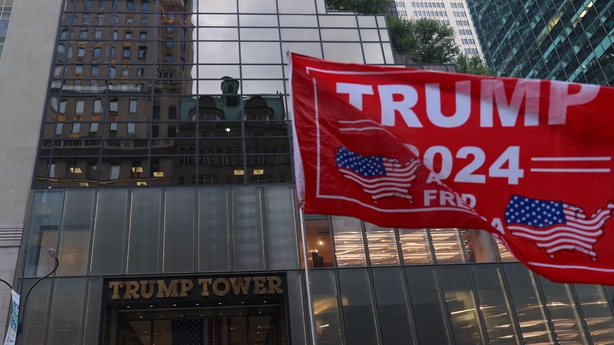
Trump - wisely - did not testify in his own defence. It would have opened him up to questioning from prosecutors on a whole range of topics, under oath - a nightmare scenario no defence lawyer would contemplate.
Trump's team only called one witness, who blew up in their face. Robert Costello, a former prosecutor in the Manhattan DA's office who rowed with the judge and caused him to erupt with anger and clear the court.
The relatively quick decision by the jury - after about 12 hours of deliberations - and the unanimous guilty finding on all 34 counts suggests that the jurors were well convinced by the prosecution argument, evidence and witnesses - Michael Cohen and all.
In New York, each count of the charges carries a maximum sentence of four years in prison, with a cumulative maximum of 20 years.
Few commentators - mostly lawyers themselves - expect Trump will face a custodial sentence: a first-time offender in his late 70s. According to some analysts, the type of felony he has been convicted of mostly does not attract prison terms for first time offenders.
But others say New York takes white-collar crime seriously (it must, to keep its vast financial services industry on the rails) - lots of people go to jail for business record fraud, they say. They think the DA will call for a custodial sentence in pre-sentencing submissions - which must be made by 27 June for the -prosecution and by 13 June for the defence.
The sentence hearing will take place on 11 July - four days before the Republican Party Convention, at which Trump is due to be formally nominated as the party’s presidential candidate. A criminal conviction does not disbar him from running for election, nor holding the office of President of the United States.
That's why Trump said, "the real verdict will come on November 5th, from the people", as he left court yesterday.
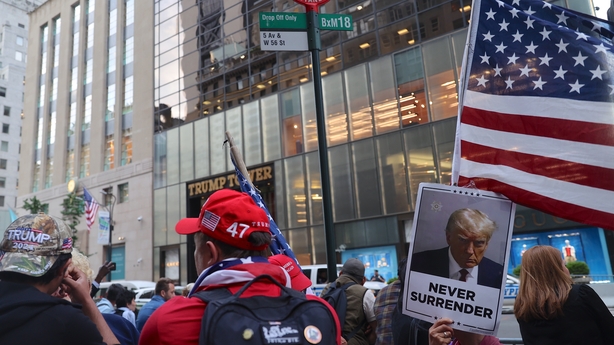
No matter what sentence is imposed on 11 July, Trump will appeal it. That process will run into next year – well past election day and the swearing in to office of the next president.
While the appeals process is ongoing, the sentence is stayed - meaning even if Judge Juan Merchan imposes a prison term in July, candidate Trump will not go to jail until all appeals have been heard and the sentence upheld.
Even then - if he wins the election - who will move against a sitting president to put him in prison? Not the Department of Justice, which has a semi-official ban on prosecuting sitting presidents already and will be headed by a Trump appointee if he wins the election.
And that is the big question now - how will this impact on the election?
Some opinion polls have indicated up to 20% of Republican voters could change their mind about voting for Trump if he is convicted of a criminal offence. A more recent poll this week among Trump voters put that figure at just 6%.
Now that the conviction has actually happened, the next set of polls will have something real to work on.
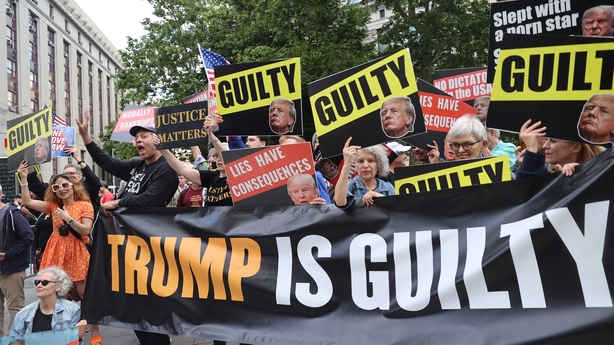
In an election as tight as this one, any shift in the voting pattern - even just a couple of percent - will make a big difference, especially if it happens in the six key battleground states.
Will he now lose votes? Will it make no difference? Or will he gain votes because of this conviction?
Having waited first for a trial, and then for the jury to come back with their verdict, we are now in a new waiting game - one that will take longer to reach a conclusion.
We are waiting for the court of public opinion to rule.






